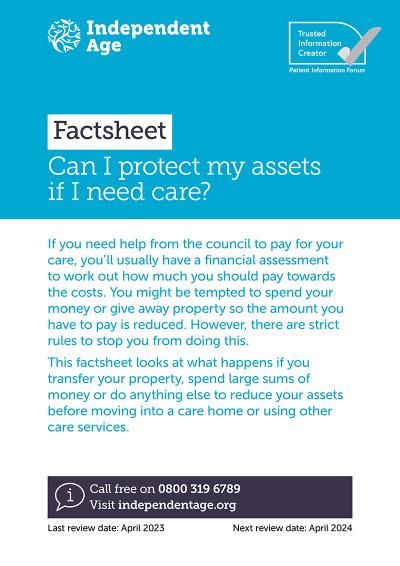Related publications

If your council arranges care and support for you, you may need to pay towards your care costs. You might be tempted to spend your money or give away property to reduce the amount you have to pay. However, this could affect your entitlement to council funding.
Assets are items you own that have a financial value. They can include your income, savings, investments and property.
If the council agree that you need care and support, they’ll look at your assets to decide how much you’ll have to pay towards your care. This is known as a financial assessment or means test. It will look at:
The financial assessment for care is different in England, Scotland and Wales, and it can be complicated. How much you pay will depend on your situation, where you live and whether you need care in your own home or in a care home.
In general, the higher your income and capital, the more money you’ll be expected to pay towards your care. Our factsheet Can I protect my assets if I need care? explains what you may have to pay in more detail.
Deprivation of assets means you’ve deliberately tried to get rid of your assets to avoid charges or reduce the amount you would have to pay for your care. There are various ways you might do this, including:
There could be valid reasons for doing any of these things. The council must consider the timing and motivation of your actions. If they decide that you knew you would need care, and you were trying to avoid paying towards it, they may see this as deprivation of assets.
When they carry out the financial assessment, the council will ask about things you used to own, as well as what you currently own. There’s no time limit on how far back the council can look at your financial affairs to see if there has been deprivation of assets. You may have to provide evidence to prove to the council that you no longer have an asset.
There are many reasons why you might have given something away. The council must consider each case individually. They’ll look at:
If the council decide you’ve deliberately deprived yourself of an asset to avoid paying care costs, they could treat you as if you still had it. They may include its full value in your financial assessment and charge you accordingly. This is called notional capital or notional income.
If you no longer have the asset, you could find that you’re expected to pay more towards your care than you can afford.
If you transferred the asset to someone else to avoid the charge, that person may be responsible for paying the council. They may have to pay the difference between what the council would have charged if you still had the asset and what they did charge.
Read our factsheet Can I protect my assets if I need care? for more information.
The rules about deprivation of assets can be complicated. If you’re not sure whether something could be seen as deprivation of assets, it’s best to ask the council.
If you’re treated as having notional income or capital and can’t pay your contribution to your care costs, you could end up owing the council money. They could claim the money you owe through the courts. However, this should only be a last resort and they should discuss other options with you first. For example, they may offer you a deferred payment agreement for care home fees.
If you transferred your assets to someone else – for example, changing ownership of your home – that person may be responsible for the debt.
If you can’t pay, the council may still have to make arrangements for your care to continue. For more information, read our factsheet Can I protect my assets if I need care?.
The council must consider all relevant information and they should write to you to explain why they have reached their decision. If you disagree, you have the right to challenge them.
There are two main ways of trying to resolve disagreements. You could:
• make a complaint through the council’s complaints procedure
• use a solicitor to pursue a legal case.
It’s a good idea to get specialist advice if necessary.
If you want legal advice, you’ll need to find a solicitor who specialises in community care law. Getting legal advice can be expensive. You may want to contact Civil Legal Advice (CLA) to find out whether you would qualify for legal aid to help pay for this. If you live in Scotland, find out if you qualify for advice and assistance.
CLA can also give you details of organisations or solicitors specialising in community care law, whether or not you qualify for legal aid. You could also find a solicitor or mediator on Gov.uk. In Scotland, contact the Law Society of Scotland.
Read our factsheet Can I protect my assets if I need care? for more information. You can also call our Helpline and arrange to speak to an adviser.
If you’re not sure whether something could be seen as deprivation of assets, you should ask your local council.
If you’re thinking of transferring your assets, you should get financial planning advice first. Visit the Society of Later Life Advisers or Unbiased to find an independent financial adviser.